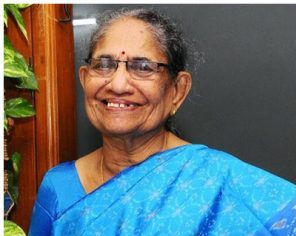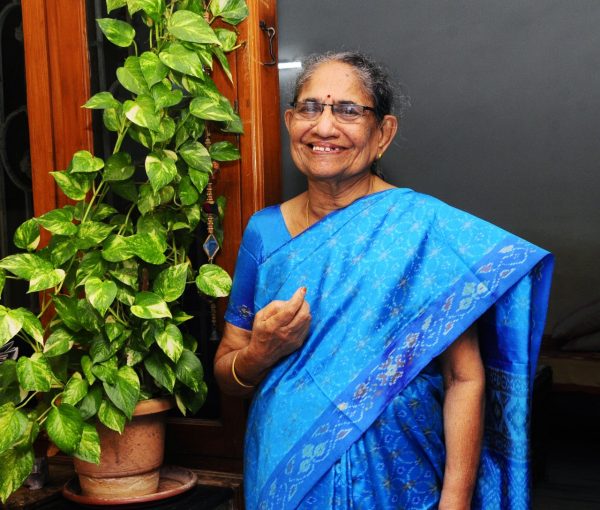
HERE I AM and other stories
15. Will he come home?
Telugu Original: P.Sathyavathi
English Translation: Y. Padmavathi
Today, the hour-long, 9999th episode of the daily serial, Royal Family, is scheduled for telecast. In today’s episode, all the actors will recall their experiences of enacting scenes and memories of memorable episodes; they will flick their hair up and down, talk in honey-sweet, accented voices. For the past ten days, the producers have been telling us viewers that this episode is not to be missed!
This is why Vijaya prepared pizza and his favourite dinner for her college-going son, ragi malt for Ammamma and chapatis for herself, before settling down in front of the newly acquired television set that was fixed to the wall. Her grandmother, Savitramma is ninety years old. The day before yesterday, she brought her home to stay with them for ten days. Vijaya’s husband is on a business trip to Singapore, her daughter is married and lives in America, and her son is in college, studying engineering – a typical middle-class family.
Ammamma is neither interested in television programmes, nor does she like to sit in an enclosed room. She likes to sit in the balcony under the open, star-studded sky, with a few plants around her. As soon as the sun starts going down, she heads to her favourite spot in the balcony.
Suddenly, she rushed into the room, saying, ‘The boy has not returned yet. It is cloudy and has started drizzling.’
Just then, an actress decked in jewellery, who played the role of the king’s daughter-in-law’s daughter-in-law, makes an entrance, and politely greets the audience. Vijaya, who is thinking, ‘The girl’s necklace is beautiful,’ is startled by Ammamma’s words. Oh my! It is already 8 o’clock. Why has the boy not returned? Why has the child not come home yet? He calls her to inform her if he is even half an hour late. When she calls him, there is no response. What has happened to him?
The rain is getting heavier!
- Hey, Motu, Chintu, Bablu, Bunty, Munna, Rahim, Raja, where is my son? I have been calling them repeatedly. All of them reply, ‘We have no idea, aunty.’
- All of you have returned. Why has he not returned?
Please, dears, call him up and find out.
- Aunty, he does not respond.
The phone is switched off even after the hundredth call.
What should I do? Every day he is home by 7 o’clock. It’s ten now, yet no sign of him. What should I do?
His father is not in the country. If I call him and tell him, won’t he get unduly worried?
‘He will come, do not worry. He must have got stuck somewhere in the rain. Let the rain stop, he will come,’ saying this, grandma drinks her malt drink and curls up on the sofa.
Vijaya goes through all the numbers of his friends and the places the boy regularly hangs out in.
The clock chimes twelve.
The neighbours are switching off their television sets to get ready to sleep, and all the vehicles have returned and are being parked in the basement of the apartment building. The boy has not returned.
Grandma pipes up once more, ‘He must be stuck somewhere, I say. Don’t brood! Eat something.’
Vijaya is maddened. ‘How can you insist that I eat when I’m dying a thousand deaths because the boy has not returned! You’ve had your ragi java, now go to sleep.’
‘I ate so that I do not get dizzy and fall down and become an additional burden,’ says Ammamma. ‘I take care of myself so that I am not a bother to others. What will you gain by becoming fretful and nervous?’
Vijaya’s feverish imagination has taken the shape of a television repeatedly playing nightmarish scenes.
On a motorbike . . . three youngsters talking on the phone, a drunk lorry driver rushing towards the motorbike in a zigzag manner at high speed. Three dead bodies scattered on the road in a pool of blood. White T-shirts soaked in red.
In the rain a lone biker . . . an unknown hitchhiker waves his hand for a lift, the bike stops. The stranger pulls the biker off the motorbike, drags him on the road and beats him badly. The man robs him of the laptop, mobile and wallet, and snatching the bike keys, runs into the darkness without a backward glance. The boy lies unconscious on the road. Vijaya fervently prays to Lord Venkateswara to keep her son safe and vows that she will walk up to the temple, not drive up.
Someone’s birthday . . . a friend invites him to a party, he refuses, they mock him. He is provoked and goes along with his friends. There are arguments . . . and from arguments to fisticuffs to a full-blown fight. Someone comments on his girlfriend, he comments on the other person’s girlfriend. No one is aware of whose life is snuffed out in the blind rage that ensues.
A youth goes to swim in the river Krishna and drowns.
Cricket betting in thousands of rupees! If they win, it is wild, wild partying! If they lose . . . where do they get money to replace the amount lost? They steal scooters, motorbikes and laptops and sell these in the grey market. The police apprehend the offenders, mask them, put them on the identification line. I hope that our innocent boy is not caught up in all this.
Ammamma repeats, ‘Our child will not get involved in all this. Do not entertain bad thoughts! You’ve raised him for twenty years, do you not know what kind of person he is? See how drenched you are in sweat. Drink a glass of hot milk to regain your energy.’
‘I will not have even a drop of water till my son returns.
My one and only son – he is my life.’ Ammamma is silent.
‘Of late, he has been giving a lift to Sandhya, the girl who lives at the end of our lane. Did her family misunderstand and take it to be a love affair and kill him? They do not belong to our caste. They beat our Venkatratnam’s grandson and dumped him – you know about it, don’t you!’ Ammamma listens silently and does not respond.
Two o’clock, three o’clock, four o’clock . . .
Vijaya paced anxiously in the room, jumping at every sound. Suddenly, she threw up. Ammamma eventually got her to go to bed and gave her a nightie to change into.
Lying on the bed, Vijaya started weeping bitterly, shedding copious tears. Ammamma listened to Vijaya’s hiccoughs helplessly. ‘Ammamma! Nowadays, it is difficult to know who your friends are and who your enemies are. A few days ago, a youth was murdered by his own friends and thrown into a canal.’
‘My child! Why do you think only unpleasant thoughts! Since last night, you have had only bad thoughts and are thinking of the worst. During the days of the freedom struggle, your grandfather would not come home for ten days at a stretch. In those days, there were no mobile phones, were there? We continued with our day-to-day chores and waited for him anxiously,’ Ammamma recalled her past.
‘Within three years of my marriage, my mother-in-law had passed away and my father-in-law married a woman my own age. Both together took care of my children and his children. When my father-in-law’s first wife’s daughters came home to have their babies, the house was full of infants and lactating mothers. With so many children, no one had time to see who came in when or worry about why they had not come home. Who had the time to imagine worst scenarios and weep? My father-in-law would occasionally gather all the children and tell them stories. The women were always busy with work. My own husband was busy with meetings and the freedom struggle. My eldest son was also involved in the freedom struggle, meetings, rallies and protest marches; he worried about the police and going underground . . . We were busy with our work and carried on with our lives, confident that they were doing good work. We never worried as you do now . . . Maybe he has stopped somewhere to help someone?’ Ammamma was angry. ‘Why does this girl think only of bad things! Has she no faith and trust in her own child, in society?’
‘Ammamma, those days were different. Today’s generation is different. If you read the daily newspapers, you will understand.’
‘Yes child! Those days, people were bound by ideology. Desires and wealth were also scarce. Your uncle was there whenever anyone needed any support. He never thought about his own requirements – neither food, nor water! I thought that your son could have inherited your uncle’s traits,’ said Ammamma.
Wiping her tears, Vijaya said, ‘Every day I advise him not to get involved in other people’s affairs and get into fixes. It is not good to be altruistic and get mired. It is enough if we are kind to ourselves; let us not meddle in others’ affairs. Let us mind our own concerns, focus on studies and settle well in life. I tell him that I will provide him whatever he needs, I will cook whatever he likes to eat. How do we know what he does once he steps out of the house?’
Ammamma was surprised. Did Vijaya mean that he should not help others as this could be risky? If he did face dangers, would no one help him and bring him home? Could she not understand that help is reciprocal? Was this the granddaughter who was brought up in my house? She was so convinced that something really bad had happened! Had the world changed so much?
The sun rose after an eternity. The child had still not returned home. The help, Durga, collected the milk packets and newspapers lying on the doorstep.
Ammamma started pleading again, ‘Get up, drink some coffee, and then figure out what to do next. Try contacting your husband’s and your friends. What do you gain by crying?’
Vijaya picked up a newspaper and turned to the crime page to look for news about murders, accidents and robberies. There was no news related to her son; only suicides of married women, road accidents . . . After calming down, she tried drinking some coffee, but could not take even a sip. Her stomach was churning. She thought: If there was an incident last night, how can it appear in the morning edition! Who will bother about accident victims lying on the road? Who has the time to call 108? Why would anyone take on an unnecessary problem? Everyone is busy in their own affairs, don’t they?’
Just then, the doorbell rang.
Vijaya sank into the sofa dejectedly. What news had the messenger brought?
Ammamma shouted, ‘Durga dear, open the door quickly.
Maybe the child has returned home!’
*****
(to be continued..)

పి. సత్యవతి గుంటూరు జిల్లా కొలకలూరులో 1940 జులై 2న జన్మించారు. ఆంధ్రవిశ్వకళాపరిషత్ లో ఎం.ఎ. ఇంగ్లిషు పూర్తి చేశారు. విజయవాడలోని ఎస్.ఎ.ఎస్. కాలేజ్ లో అధ్యాపకులుగా పని చేసి పదవీవిరమణ పొందారు. ఆమెకు అపారమైన బోధానానుభవమే కాదు, తెలుగు, ఆంగ్ల సాహిత్యాలపై పూర్తి పట్టు ఉంది. అన్నిటికి మించి తెలుగు సమాజాన్ని క్షుణ్ణంగా దగ్గరనుంచి పరిశీలిస్తున్నారు. అందుకే నాలుగు దశాబ్దాల తెలుగు స్త్రీ, వారి రచనల్లో మనకు కనిపిస్తుంది. వీరి తొలి కథ 1964లో ఆదివారం కోసం రాశారు. దీనిలో ఆదివారమైనా స్త్రీకి సెలవు ఉండాలని, అది వ్యక్తిగతమైన పనులు చేసుకోడానికి అవసరమని వివరిస్తుంది. 1975లో మర్రినీడ కథా సంపుటి వీరిని రచయిత్రిగా పాఠకలోకానికి పరిచయం చేసింది. ఆంధ్రజ్యోతి సచిత్రవారపత్రిక ప్రచురించిన కథలలో పాఠకుల అభిప్రాయాల ద్వారా ఈ కథకు బహుమతి వచ్చింది. పి. సత్యవతి కేవలం కధా రచయిత్రే కాదు నవలలు, వ్యాసాలు, అనువాదాలు కూడా చేశారు.
